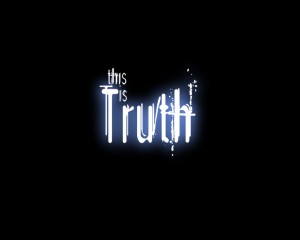 Have you ever wondered why God doesn’t make Himself more obvious?
Have you ever wondered why God doesn’t make Himself more obvious?
Have you wondered why He doesn’t write His name in the clouds so they say, “I Am God and I Exist! Believe in Me!” or call out to us with a booming voice from heaven, or simply just show up in all His splendor and glory?
Even when He did come in the person of Jesus Christ, He came masked in human flesh, cloaking Himself in humility and frailty.
Why does God do this?
Why does God hide?
Why doesn’t God make Himself more … obvious?
I have been thinking about this off and on for … well, just about my whole life.
I remember in my teens reading Romans 1 where Paul says that God has revealed Himself in nature so that men are without excuse, and I remember thinking, “I don’t know about that … I see evidence of God in the beauty and complexity of creation, but I also see a whole lot of evil. God’s existence and management of the universe is not obvious. If God had wanted to make Himself obvious, He should have spelled out His name in the stars or something. God should show up every 50 years or so just to prove to each generation that He is still around.”
I know that many people think that this is what God IS doing through answer to prayer, and daily blessings, and so on, but in our more honest moments, I think all of us wish that God would make His existence more obvious.
(Of course, probably no matter what He did, we humans would still explain it away somehow… we have an amazing ability to ignore what is plainly set before us… but this is a tangent I won’t follow…. )
We all want God to just jump down out of heaven and show up in front of us, and shout, “I’m here! I know what you’re going through! I have heard your prayers! I am with you! I will help you!”
But He doesn’t.
I want God to hit me over the head with a two by four!
I remember as a pastor standing out side of my house with a man from the church who struggled with alcohol. He had just come off a drinking binge and was standing there in my yard repenting and confessing and wondering if God still loved Him and forgave Him even though he had failed God AGAIN!
I kept trying to reassure this man that God will always love him and forgive him, but he wasn’t taking my word for it, nor did he want Scripture verses. He wanted God Himself to show up. He kept saying, “You know what I need pastor? I need God to hit me over the head with a two by four. I just want God to cold-cock me. To lay me flat out on my back!”
 He and I were talking next to our wood pile (we heated our home with fire wood) and there was a two by four sitting right on top … it was about four feet long … perfect for knocking someone over the head. He pointed to it and said, “See that two by four, God? Come on! Hit me over the head with it! Right now! If you exist and if you love you me, knock me out!”
He and I were talking next to our wood pile (we heated our home with fire wood) and there was a two by four sitting right on top … it was about four feet long … perfect for knocking someone over the head. He pointed to it and said, “See that two by four, God? Come on! Hit me over the head with it! Right now! If you exist and if you love you me, knock me out!”
God never did, of course …
But I almost reached out and picked up that two by four and hit this man over the head. I came so close. He would have gotten angry and asked why I did it, and I would have said, “God told me to.”
I didn’t do it, though.
One reason was because I was afraid I might kill him, and the other reason is because I was pretty sure he had a gun in his car. I was afraid that if I hit him over the head, he might shoot me …
The point is that I think that in our more honest moments, all of us feel like this man.
We desperately need God to show up, and He doesn’t.
God never seems to show up when we most need Him to.
At least, He doesn’t show up in any way we can discern.
We’re even willing to suffer violence at the hand of God if He would just stop hiding from us!
But instead, God always seems to be Missing in Action. Distant. Giving us the silent treatment.
It is so frustrating.
And many of us end up feeling like we have offended God. That He is angry with us and wants nothing to do with us any longer.
Why Does God Hide?
Anyway, I have recently realized why God hides … Why God does not make Himself more obvious … Why He doesn’t write His name in the clouds or knock us over the head with two by fours.
 God hides Himself because God loves and respects us so much.
God hides Himself because God loves and respects us so much.
If God revealed Himself to all humanity in the way that we want, we would have no choice to believe in Him and follow Him.
If God showed up in all His power and glory — if we survived this appearance (which we probably wouldn’t) — we would be forced to submit to Him.
And God never forces Himself on anyone.
God does not want to force people into believing in Him.
He has no desire to make people follow Him against their will. God wants us to love Him, and He knows that love cannot be forced.
If He showed up in all His power and glory, it would akin to a man holding a gun at a woman’s head and screaming at her, “LOVE ME!” We call that rape.
And God is not like that. God does not rape.
He knows that forced love is not real love. And more than anything else, God desires real and genuine love from us.
God knows that if He were to reveal Himself to us the way most of us want, we would be forced into loving Him.
Terence Fretheim in his book, The Suffering of God, states this point brilliantly:
For God to be fully present would be coercive; faith would be turned into sight and humankind could not but believe. For God to be loved by people for God’s own sake, without being forced into it, requires a measure of human autonomy. Too direct a divine presence would annul human existence as a flame kills a butterfly. God must set people at a certain distance from God; whatever the intensification of presence, there must an element of ambiguity. God’s presence cannot be obvious.
Yes, this is why God hides. This is why He withdraws. This is why He retreats.
 Because He loves us.
Because He loves us.
But even from afar, He is not silent.
Though He wants us to love Him, He first loved us, and love is not silent.
And then He woos.
He calls.
He sends “secret admirer” gifts.
He writes mysterious love notes.
He writes love songs and records them on our hearts.
Then He waits. And He hopes.
He waits for us to seek Him.
He hopes that we will search for Him.
And when we do, He begins to reveal Himself in new and exciting ways that He could not do before.
So do you want to see God? Look for Him. He is not obvious, but He is there.
And when you seek for Him, you will find Him, when you seek Him with all your heart.
God is not so hidden that He cannot be found.




 Since I love to study Scripture and read theology, I believed and taught that every Christian should do the same.
Since I love to study Scripture and read theology, I believed and taught that every Christian should do the same.  So I do my best. I study hard. But I
So I do my best. I study hard. But I 



 Or take prophecy. Are prophetical statements about future events true? Well, they do reveal divine intent, and since God can bring about what He intends, we could say that prophetical statement are more true than the statements about any human intent, but again, are statement about future historical events actually true before they occur?
Or take prophecy. Are prophetical statements about future events true? Well, they do reveal divine intent, and since God can bring about what He intends, we could say that prophetical statement are more true than the statements about any human intent, but again, are statement about future historical events actually true before they occur? 

 This sort of makes God like Freddy Krueger, except that He carves up His own Son.
This sort of makes God like Freddy Krueger, except that He carves up His own Son. God has redeemed the crucifixion so that we now sing songs about it and listen to sermons about the horrible death of an innocent victim with smiles on our faces. But this doesn’t make the crucifixion “good.” It only reveals God’s ability to redeem anything and everything.
God has redeemed the crucifixion so that we now sing songs about it and listen to sermons about the horrible death of an innocent victim with smiles on our faces. But this doesn’t make the crucifixion “good.” It only reveals God’s ability to redeem anything and everything. 
 And yet … let’s be honest … saying that “everything came from God” only pushes the logical causality of everything further back one step. If I have trouble believing that everything came from nothing, and so say that everything came from God, the question is then, “Well then, where did God come from?” The Christian answer is that He didn’t come from anything; He just always was.
And yet … let’s be honest … saying that “everything came from God” only pushes the logical causality of everything further back one step. If I have trouble believing that everything came from nothing, and so say that everything came from God, the question is then, “Well then, where did God come from?” The Christian answer is that He didn’t come from anything; He just always was.
